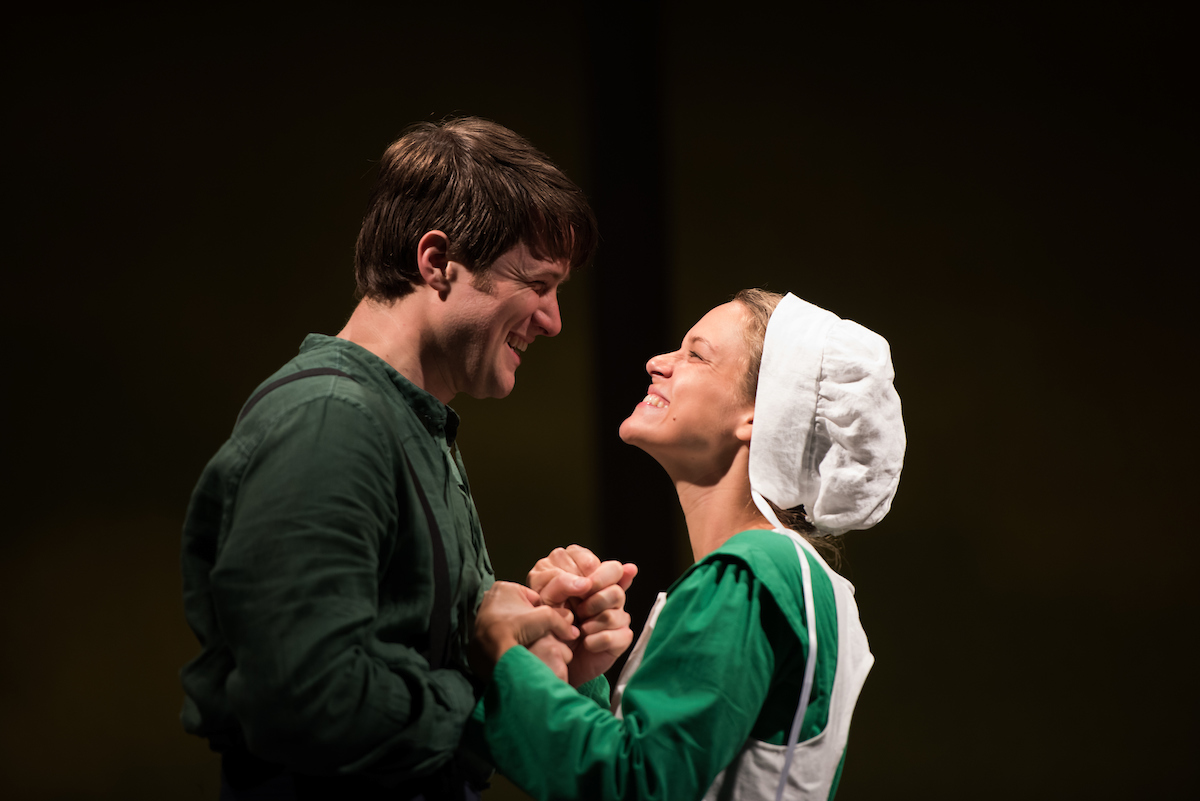
Lucky Gretzinger and Jessica Savage in “Everything is Wonderful” by Chelsea Marcantel. (Seth Freeman)
by Peter Marks | Published 7/11/17
SHEPHERDSTOWN, W.Va. — In the sedate hills of the West Virginia panhandle, a new play is placing an especially unsettling wake-up call. The ringing is measured but angry, composed and yet brutal — a sound that seeks to shake us out of our complacent confidence that people of good will and adjacent values can find a way forward together.
The disturbance emanates from Eleanor Burgess’s scintillating “The Niceties,” a world-premiere work rattling audiences at the Contemporary American Theater Festival, the 26-year-old summer gathering of playmakers in this historic college town about 90 minutes from Washington. Staging an ambitious roster of plays — and this year, boosting its calendar for the first time from five entries to six — the festival under founding producing director Ed Herendeen has matured into one of the nation’s most satisfying seasonal destinations for original drama. Or as Herendeen put it, in a short welcoming speech on the festival’s opening night Friday: “The oldest town in West Virginia is doing the newest plays in America.”
“The Niceties,” performed with precision-guided authenticity by Margaret Ivey and Robin Walsh, as a relentless Ivy League student of color and the equally headstrong, liberal, white history professor whose pieties and prerogatives are systematically dismantled, is the best of a well-chosen cohort. They include a perceptive, character-rich drama about forgiveness in an Amish community, Chelsea Marcantel’s “Everything Is Wonderful”; and Evan Linder’s “Byhalia, Mississippi,” a conventional touchy-situation comedy elevated by strong seriocomic writing and Marc Masterson’s sterling direction.
The impulse to compare and contrast is hard to resist at a festival such as this, where a visitor can see as many as six plays in 2½ days. Walking from one to the other of the three stages on the campus of Shepherd University — two of which belong to the festival, with plans for its own new third space — you hear lots of people declaring their favorites and seeking out advice about which other shows to sample. So some ranking of experiences inevitably occurs, although it should be added that virtually across the board in Shepherdstown, you’ll encounter work of promise.
Kara Lee Corthron’s “Welcome to Fear City,” for example, creates a clever kaleidoscopic structure to underline the marginalization of her characters, inhabitants of the Bronx in the late 1970s. It’s the most daringly inventive of the offerings, but an overuse of satirical meta-theatrics blunts the evening’s impact. David Meyers’s “We Will Not Be Silent” is a fact-based account of the Nazis’ arrest and execution of Sophie Scholl, a Christian student resister played by Lexi Lapp. Under Herendeen’s direction, she and Paul Deboy, as her reluctant interrogator, ably re-create the dire circumstances, but the veil of solemnity is never adequately lifted and the piece as a result lacks electricity. And in “Wild Horses,” an elegiac solo piece by Allison Gregory that memorializes the best and worst of teenage girlhood, actress Kate Udall exudes charm by the bucketful, even if the play, directed by Courtney Sale, feels more literary than fully dramatic.
Some of the plays are linked tangentially by themes of national interest, such as the malignant staying power of racism, or the toll exacted in standing up to injustice. In the ironically titled “Everything Is Wonderful,” Marcantel tackles with a mixture of humor and pathos a more spiritual question: How do we respond to those who’ve done us harm? A distraught young man played by Jason Babinsky arrives at the house of a grieving Amish couple (Deboy and Hollis McCarthy), with an odd request. He’s seeking retribution — against himself. Deboy’s Jacob and McCarthy’s Esther know all too well why he’s come (you’ll have to discover this for yourself). And how and why they decline to give him what he wants is one of the disarming cruxes of the play, skillfully staged by Herendeen and handsomely embellished by David M. Barber’s sets and Therese Bruck’s costumes.
Given the terrible magnitude of the offense Babinsky’s Eric has unwittingly committed, you may find his desire for contact and Jacob and Esther’s capacity for providing him shelter and space to recover hard to process. But that seems to be one of the points of “Everything Is Wonderful.” Tolerance and forgiveness feel like exotic concepts in this day and age — and make no mistake, Jacob and Esther and their daughters (Lapp and Jessica Savage) have their own serious problems. At a time when we’re all evincing so little patience for the viewpoints and even the tragedies of others, the forbearance of Jacob and Esther is a consoling miracle.
The notion of seeing the harsh realities of the contemporary world through another person’s eyes is taken to a more gripping level in “The Niceties,” a two-person play destined to be staged everywhere. Here it’s under the bracing direction of Kimberly Senior that in the seemingly safe confines of a revered professor’s office, a student, Ivey’s Zoe, tries to open the heart and mind of the instructor, Walsh’s Janine, to the racism that exists as a fact of Zoe’s life. And that Zoe believes, despite the teacher’s indignant protestations, suffuses her course on the history of revolutions.
The fuse that’s ignited in Janine’s book-filled study sparks a clash complexly and entertainingly rendered by Burgess, a recent Yale graduate. It’s a microcosm of a wrenching confrontation occurring on campuses across the country, with hardening views on both sides of a generational and ideological divide, and as Burgess recounts, among people who might otherwise be natural political allies. Taking shape around a paper Zoe has submitted for Janine’s class, the fight starts as a seemingly civil review of the professor’s suggestions for improving the thesis. It soon explodes into a vituperative battle of wills, an exchange of charges and threats and gambits that reveals reasonable arguments and unreasonable demands, and ultimately, a crusade that might ruin both their careers.
Ivey is flat-out marvelous as Zoe. She synthesizes the character’s contradictions with stunning clarity: the elegant mind and the blind rage; the courage and the self-destructiveness. Walsh accomplishes something wonderful, too, a portrait of the disintegration of academic composure. You watch with admiration as it registers in Walsh’s serene features that Janine’s secure world of intellectual rigor and reward is under lethal attack.
The playwright suggests in “The Niceties” that not every pedagogical chasm can be bridged. At one point, Zoe angrily asserts that slaves have been left out of Janine’s teachings on the American Revolution. “You’re excluding the people who couldn’t leave evidence behind!” she declares.
“An unfortunate consequence of methodology,” Janine replies.
The phrase may sound academically neutral, but in Zoe and Janine’s struggle to define what history is — and was — words have harrowing consequences. The story of America, it seems, is destined to be wrestled over to the bitter end.
Contemporary American Theater Festival Through July 30 at Shepherd University in Shepherdstown, W.Va., Visit catf.org or call 304-876-3473.






